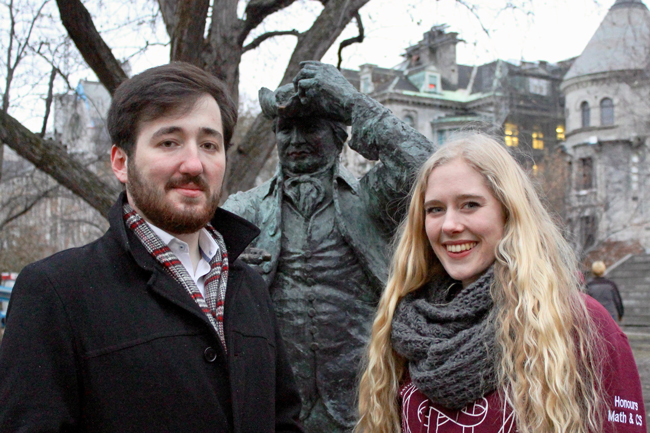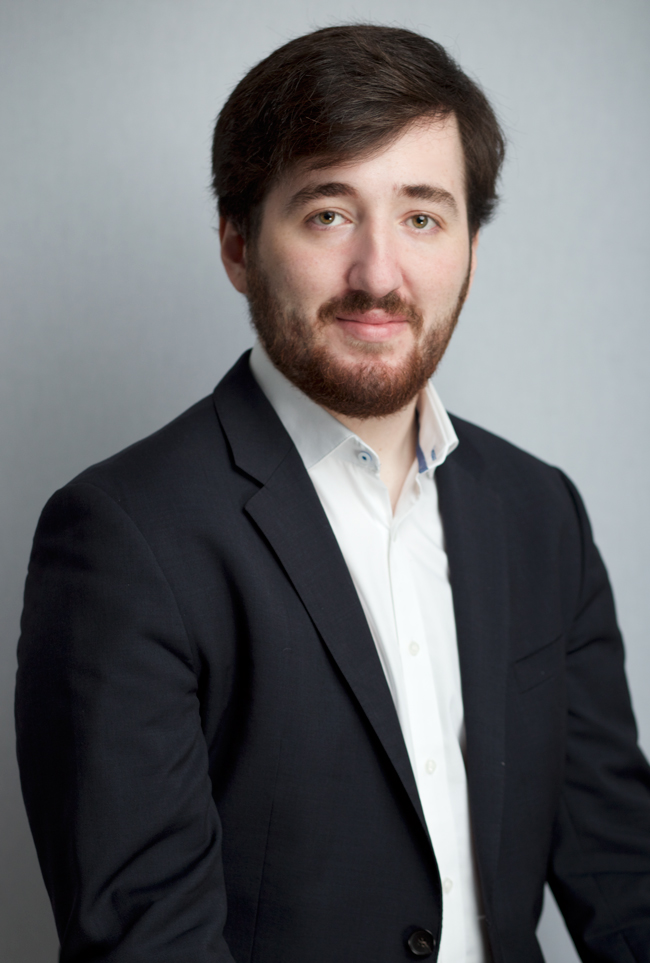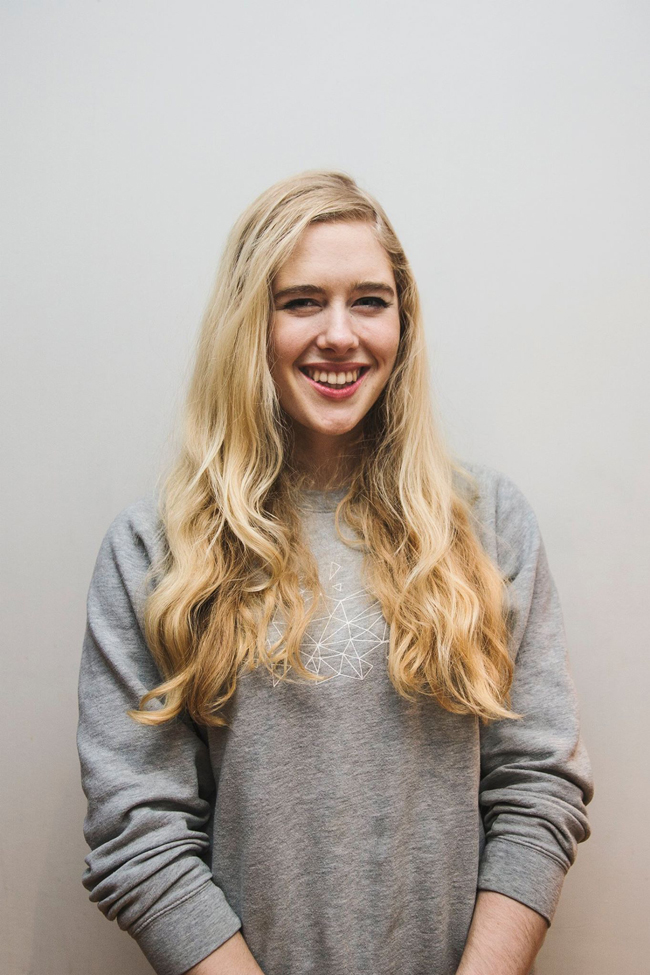
Clare Lyle, a U3 Joint Honours Math and Computer Science student, and Alexander Lachapelle, currently pursuing his Medical Doctorate and Master of Surgery, have been awarded Rhodes Scholarships. This brings to 144 the number of McGill Rhodes Scholars since the awards were created in 1902 to provide for studies at the University of Oxford, the most in Canada.
Both Lyle and Lachapelle will finish their McGill studies in May before heading out to Oxford in October for the next phase of their academic adventure. The Reporter spoke with both recipients to find out what respective road they took to Rhodes and what they hope to accomplish when they get there.
Alexander Lachapelle: Always more to discover
On the verge of completing his Doctorate of Medicine and Master of Surgery (M.D.,C.M.) at McGill, Alexander Lachapelle has also undertaken a formidable engineering task over the past several years – working to build better bridges between medicine and innovation.
Partway through his studies, but wanting to learn the world of medical technology inside and out, Lachapelle took the road less travelled, but one he believed would best serve his vision. Putting his studies on hold for a year to work in healthcare policy, he moved to New York and joined an artificial intelligence start-up, where he worked applying machine learning to diagnostic radiology.

“Basically, we were creating deep learning algorithms to help reduce diagnostic errors and improve patient outcomes,” says Lachapelle. “It was one of the most enriching experiences of my life,” he says of his time in New York, “because it showed me two things. First, it gave me a real sense of how much machine learning can improve the quality of and the access to healthcare for patients, through early disease identification and management.
“But it also gave me insight into the complex process that goes into innovating clinical care,” Lachapelle continues. “Even once you’ve developed the technology and published the results, you still have to go through the regulatory process; you have to develop a commercialization strategy; you have to get all the right partners around the table working on the more entrepreneurial side of things, you have to teach the healthcare professionals how to use it and make sure it works, you have to update it and adapt it to changes in the literature. These are so many things you have to take on to get a new tool to the patient.”
Not surprisingly, Lachapelle plans on focusing on these interests while at Oxford. “I want to study how we can use technology – more specifically, machine learning – to improve access to healthcare, in Canada and globally. How can we work together and make sure that innovation doesn’t just live in a publication and that it actually benefits the patient?”
People working together is a common theme in Lachapelle’s life. A Terry Fox Scholar, he said he decided he decided to become a doctor when he was a teen working with the Dr. Julien Foundation, a Montreal social pediatrics enterprise that ensures children living in vulnerable circumstances have access to pediatrics care. “Rather than just treating the disease, [the Foundation] brought everyone from the child’s life around the table – from the parents to the teacher to the speech therapist to the pediatrician,” he says. “The Foundation works on dozens of projects, in Montreal and in Quebec. In this case, we developed a new summer social pediatrics program, and we raised over $200,000 to support it through partnerships with local organizations and the governments of Canada and Quebec. It made me realize firsthand the importance of the social aspect of medicine.”
As if Lachapelle wasn’t busy enough, he has also done a lot of health policy work over the past several years. Last year, he was elected to be the official representative of medical education for the International Federation of Medical Students’ Associations (IFMSA), an organization that represents some 1.3 million medical students from 127 countries.
As such, Lachapelle represented the IFMSA at conferences and meetings organized by, among others, the World Health Organization, UNESCO and the U.S. Congress. He also sat on the executive board of the World Federation for Medical Education.
“It really gave me opportunity to see what happens behind the scenes when health policies are being created,” he says. “How do you plan your health workforce; how do you ensure social accountability of the medical curriculum; how do you train the doctors of tomorrow?
“I saw a real desire for a lot of schools to teach their students to become lifelong learners,” says Lachapelle. “With medicine evolving so fast, especially on the technological side, how do you keep people in the mode where they always read the literature and stay up-to-date, so that they aren’t just learning medicine once? There is always so much more to discover!”
Clare Lyle: Interested in pretty much everything
If you’re going to recite a list of Clare Lyle’s interests and accomplishments, you’d better take a deep breath beforehand
Recent Rhodes Scholarship aside, Lyle is pursuing a Joint Honours Math and Computer as a Loran Scholar, Canada’s most comprehensive undergraduate award for character, service and leadership. On top of her classroom prowess, the native of Gibsons, B.C. (population 4,605) is the web editor for the McGill Tribune, Director of HackMcGill and the Computer Science Undergraduate Society representative for students. She is also a mentor for Ladies Learning Code, leading workshops to teach women how to code.
If that wasn’t enough, Lyle has served as co-chair of the World University Service Canada, during which time she worked to increase funding for the student refugee program.
An avid musician (clarinet, bass, saxophone, cello and piano), Lyle is also a basketball player who organizes kids’ basketball camps. And, of course, there are the animals. Lyle was a volunteer at her local animal shelter for eight years.

“It’s not a huge secret,” Lyle says with a shrug when asked why she is involved in so many different activities. “I do things that I find interesting and meaningful. I just happen to find a lot of things interesting and meaningful.
Right near the top of Lyle’s list of interesting and meaningful things is computer science. “I think it helps that I love my program so much that I see homework as a fun thing I get to do on the side,” she says.
At Oxford, Lyle will work toward a DPhil in Computer Science. “I am especially interested in looking at theoretical foundations for machine learning,” she says. “Right now, there has been a lot of success empirically, but it isn’t really understood why our empirical results have been so good. I hope to focus on this.”
It won’t be Lyle’s first stay at Oxford. The Loran program has Fellows doing summer internships along different themes. “I wasn’t sure what I could do in public policy that would be very meaningful or that I could contribute to as a computer scientist,” says Lyle. “Then I came across [the Future of Humanity Institute] at Oxford. I spent the summer looking at the public policy implications of artificial intelligence.”
When asked how she reacted when she got the call from the Rhodes people, Lyle laughs. “My roommate had had a deathly cough and, as a result, I had a bad sleep the night before. I was actually taking a nap, sort of mid-afternoon when they called,” she says. “I was still half asleep when they asked me if I would accept the Rhodes Scholarship. Honestly, there was this moment where I said ‘Wait, did I wake up yet or is this a dream?’
“I was thrilled. The way they pose the question is they ask you, ‘If we offered you a Rhodes Scholarship, would you accept?’ I think I said ‘Yes’ twenty times. I didn’t want there to be any doubt,” she says.
Lyle will be graduating in the spring and she reflects upon her time at McGill with fondness. “I’ve had a lot of really fantastic mentors here without whom I definitely would not be here today,” she says. “I’m blown away by the sense of community here, even though it is a big university. Once I got into my department, I felt like I was back in a small town again. The profs know my name and ask me how I’m doing when we pass in the hall.”
Lyle chose McGill because “it is a fabulous university,” but also because she has roots here. “I figured university was a chance to live somewhere else for 3-4 years. I wanted to live in a completely different part of Canada and experience something completely different,” she says. “My grandmother grew up near Montreal and I still have some relatives here, so I wanted to get back to my French Canadian roots.”
Her coming to McGill was the first time Lyle was away from her parents. “It was a good stepping stone for my parents getting used to me not being around,” says Lyle with a laugh, “which is a good thing now that I’m going to Oxford.”
And how did her parents take the news of the Rhodes Scholarship? “They were ecstatic,” says Lyle, “maybe more excited than I was – if that is possible.”
